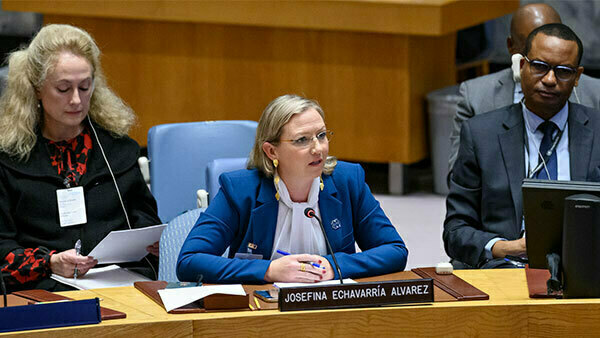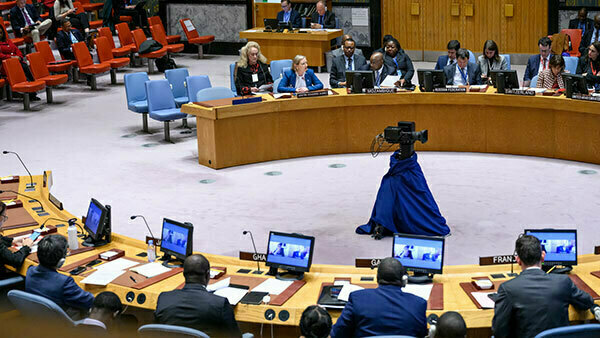On the world stage: Kroc Institute’s Peace Accords Matrix invited to brief the UN Security Council
The aim of Chapter 6 of the United Nations Charter is both broad and thoughtful. It requires countries with disputes that have the potential to lead to war to first seek solutions through peaceful methods. These include “negotiation, enquiry, mediation, conciliation, arbitration, judicial settlement, resort to regional agencies or arrangements, or other peaceful means of their own choice,” according to the charter. If alternative dispute resolutions fail, countries must refer their disputes to the UN Security Council, the entity charged with ensuring international peace and security.
Such a scope made the Peace Accords Matrix (PAM) a natural guest to address the UN Security Council on Oct. 20 as part of its open debate, “Peace through Dialogue: the Contribution of Regional, Sub-regional and Bilateral Arrangements to the Prevention and Peaceful Resolution of Disputes.” PAM Director Josefina Echavarría Alvarez shared the program’s evidence-based research with the Council, noting the importance of dialogue for successful peace agreements.

the Security Council meeting on “Peace through Dialogue: the Contribution of Regional,
Sub-regional and Bilateral Arrangements to the Prevention and Peaceful Resolution
of Disputes,” on Oct. 20, 2023.
“Sustained dialogue is most needed when there are disagreements and political difficulties,” she shared as part of her remarks.
“These are the best times to deepen our understanding of how and when the implementation of peaceful arrangements fails – not an uncommon occurrence – and focus our attention on how to design and implement peaceful arrangements that can succeed in the short, mid- and long term.”
PAM is one of the pillars of the Kroc Institute for International Peace Studies, part of the Keough School of Global Affairs. The program has researched 34 intra-state comprehensive peace accords signed since 1989 and designed a methodology to monitor and compare the implementation of commitments among the peace accords. Meanwhile, its Barometer Initiative project in Colombia monitors the implementation of the 2016 Colombian Peace Accord. It represents the first time a university-based research center has played a direct role to support implementation of a peace agreement by reporting progress and identifying issues in need of attention and opportunities for advancement.
Collectively, PAM has garnered worldwide accolades because of its work, which prompted the Permanent Mission of Brazil to invite PAM to present to the Council last month (Brazil occupied the Security Council Presidency in October 2023; each of the Council’s 15 members rotate monthly to serve in this capacity).
“I asked myself, ‘What are the key takeaways I want the UN Security Council to remember about the University of Notre Dame’s contribution to peace and security, as a leading university and civil society organization? What points can be helpful to security council members in their roles, for their countries, as they seek to overcome violence?’” said Echavarría Alvarez.

Contribution of Regional, Sub-regional and Bilateral Arrangements to the Prevention and
Peaceful Resolution of Disputes,” on Oct. 20, 2023.
With this in mind, she threw the spotlight on three “must haves” for peace agreements to be successful:
-
That commitments in a peace accord go beyond military and security provisions and include political and social development, gender and ethnic rights, and justice-related reforms;
-
That those most affected by war – often marginalized communities such as women, youth, and ethnic groups – participate at the negotiation table and during implementation; and
-
That strong, independent and reliable monitoring and verification mechanisms are part of the infrastructure of a peace accord.
Echavarría Alvarez’s presentation at the UN Security Council is the latest example of international doors opening to PAM and the Kroc Institute. The success of PAM’s Barometer Initiative attracts requests from around the world to engage in similar peace accord processes. Most immediate are plans to work in the Philippines, monitoring implementation of part of the country’s peace accord.
“PAM represents a top-tier research and policy program at the University, whose services are being requested by nations around the globe in need of assistance with peace accords processes,” said Asher Kaufman, John M. Regan, Jr. director of the Kroc Institute.
“As PAM’s work expands, so does its international visibility and reputation with an ever-growing, diverse audience. Josefina’s recent invitation to the UN demonstrates just how important, needed, and revered this research is,” he added.
Originally published by at kroc.nd.edu on November 27, 2023.
Latest Research
- Biseach Symposium Strengthens Cancer Research Partnership Between Notre Dame and University of Galway…
- Notre Dame announces new research collaborations with Ukrainian Catholic UniversitySeven faculty teams of collaborators from the University of Notre Dame (South Bend, Indiana, USA) and Ukrainian Catholic University (Lviv, Ukraine) have received grants from Notre Dame Global and Notre Dame Research to pursue…
- From reaction to resolution: The future of allergy treatmentTwelve-year-old Lauren Eglite was thrilled to attend a Notre Dame football game with her father, Erik, in 2017, even though her acute peanut allergy demands constant vigilance. She was even more excited when the stadium’s brand-new video board aired an NBC Fighting…
- New Study Highlights Mother-Child Link for Anemia in The GambiaAnemia is a "silent epidemic." It affects nearly 2 billion people globally, yet many people ignore its symptoms. Typically caused by the consumption of iron-deficient foods, anemia develops gradually. Its symptoms—such as fatigue, weakness, and shortness of breath—are frequently dismissed or misattributed.
- Megan McDermott joins ND–IBM Tech Ethics Lab as new Notre Dame directorThe Notre Dame–IBM Technology Ethics Lab, a critical component of the Institute for Ethics and the Common Good (ECG) and the Notre…
- Jenkins Center for Virtue Ethics receives grant to advance love-based ethical frameworkThe University of Notre Dame has received a $10 million grant from the John Templeton Foundation to support a project titled Love and Social Transformation: Empowering Scholars and Social Innovators to Develop the Love Ethic.












